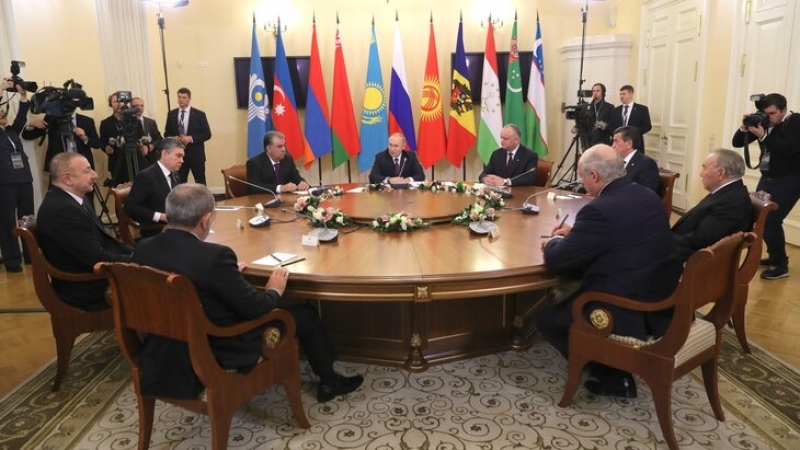
CIS Summit: Challenges and Threats will Grow
30 December 2022
The traditional New Year's Eve summit of the CIS heads of state, which was held on December 26-27 in St. Petersburg at a difficult time - in 2022, the largest military conflict broke out in the former USSR after the end of the World War II. Russia's invasion of Ukraine has heightened doubts about the prospects for the future of the CIS, and its mobilizing function is declining year after year.
The owner of the house, Russian President Vladimir Putin, acknowledged the existence of threats to the Eurasian space, urging those present to join forces to ensure the security of the Commonwealth.
“The key area of cooperation between the CIS countries is the maintenance of security and stability in our common Eurasian region. Unfortunately, the challenges and threats in this area, primarily from outside, are only growing every year,” Putin said.
In fact, the CIS has been going through hard times since its creation in 1991. Earlier, Georgia and Ukraine left the organization. The President of Moldova once again, ignoring, misses the summit. The conflicts between Azerbaijan and Armenia and between Kyrgyzstan and Tajikistan in 2022 escalated into regular military clashes. And the next CIS summit turned out to be unable to resolve their relations. The leaders dispersed without accepting any peacekeeping documents.
Putin failed to bring together the positions of the conflicting parties in the South Caucasus and Central Asia. The presidents of Tajikistan and Kyrgyzstan, Rahmon and Japarov, never shook hands, and Aliyev and Pashinyan, at Putin's initiative, held a formal exchange of views on the sidelines of the summit, without resolving the Lachin crisis.
The CIS as an institution of the commonwealth of the former Soviet republics, designed to ensure stability and prosperity in the post-Soviet space, is increasingly acquiring a phantasmagoric shape because of a series of aggressions by the main person involved in the organization - Russia against its partners in the face of Georgia, Ukraine and Moldova. And threats against other countries of the commonwealth from Moscow do not stop, periodically reminding of themselves.
Putin did not offer the summit to discuss and adopt any significant documents and decisions in the field of security. And this may indicate the unwillingness, first, of Moscow to burden itself with certain obligations to partners and not tie its hands, which can be untied in relation to any of the leaders who were at the meeting.
Russia's desire to maintain the same formal and beneficial level of relations next year is evidenced by the fact that 2023 is declared the year of the Russian language in the CIS countries. It is difficult to imagine how effectively this humanitarian issue of the security problem in the CIS can be resolved. So, the problems of challenges and threats that Putin spoke about in his opening speech, with this approach, should have a growing trend.
https://astna.biz/ext/news/2022/12/free/region-ussr/en/2808.htm
The owner of the house, Russian President Vladimir Putin, acknowledged the existence of threats to the Eurasian space, urging those present to join forces to ensure the security of the Commonwealth.
“The key area of cooperation between the CIS countries is the maintenance of security and stability in our common Eurasian region. Unfortunately, the challenges and threats in this area, primarily from outside, are only growing every year,” Putin said.
In fact, the CIS has been going through hard times since its creation in 1991. Earlier, Georgia and Ukraine left the organization. The President of Moldova once again, ignoring, misses the summit. The conflicts between Azerbaijan and Armenia and between Kyrgyzstan and Tajikistan in 2022 escalated into regular military clashes. And the next CIS summit turned out to be unable to resolve their relations. The leaders dispersed without accepting any peacekeeping documents.
Putin failed to bring together the positions of the conflicting parties in the South Caucasus and Central Asia. The presidents of Tajikistan and Kyrgyzstan, Rahmon and Japarov, never shook hands, and Aliyev and Pashinyan, at Putin's initiative, held a formal exchange of views on the sidelines of the summit, without resolving the Lachin crisis.
The CIS as an institution of the commonwealth of the former Soviet republics, designed to ensure stability and prosperity in the post-Soviet space, is increasingly acquiring a phantasmagoric shape because of a series of aggressions by the main person involved in the organization - Russia against its partners in the face of Georgia, Ukraine and Moldova. And threats against other countries of the commonwealth from Moscow do not stop, periodically reminding of themselves.
Putin did not offer the summit to discuss and adopt any significant documents and decisions in the field of security. And this may indicate the unwillingness, first, of Moscow to burden itself with certain obligations to partners and not tie its hands, which can be untied in relation to any of the leaders who were at the meeting.
Russia's desire to maintain the same formal and beneficial level of relations next year is evidenced by the fact that 2023 is declared the year of the Russian language in the CIS countries. It is difficult to imagine how effectively this humanitarian issue of the security problem in the CIS can be resolved. So, the problems of challenges and threats that Putin spoke about in his opening speech, with this approach, should have a growing trend.
https://astna.biz/ext/news/2022/12/free/region-ussr/en/2808.htm












